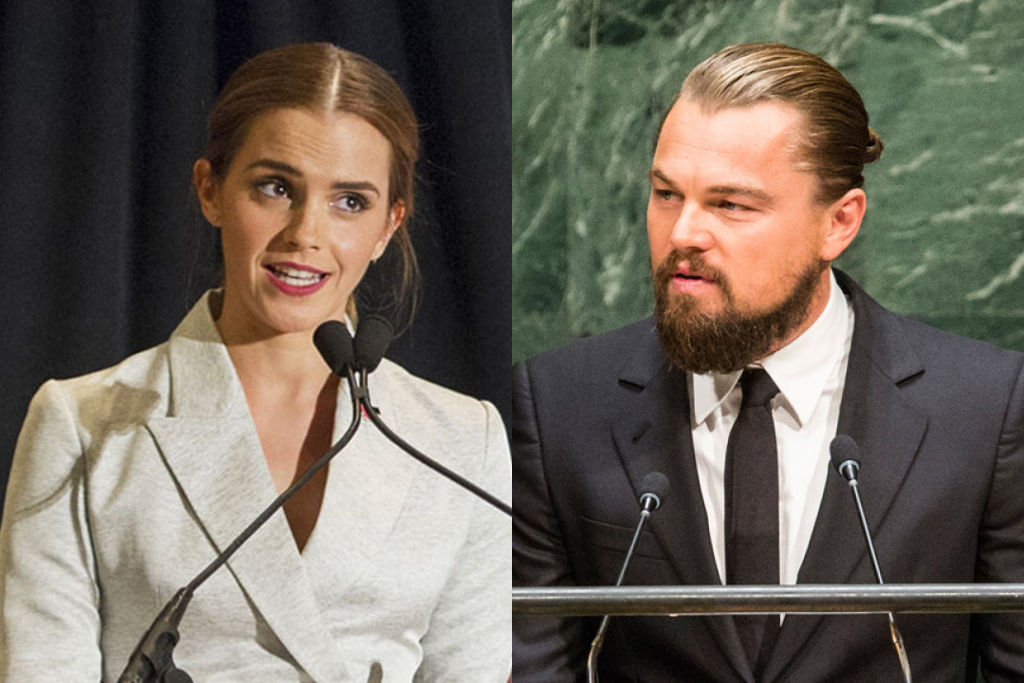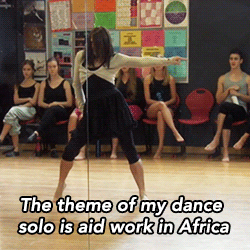How To Do Celebrity Activism: What Emma And Leo Got Right This Week
Well-meaning celebrities often use their famous faces to help good causes. Sometimes it works. Sometimes it doesn't.

Let’s get this clear from the outset, Emma Watson kicked ass at the UN this week. I’m not saying otherwise. Speaking as a goodwill ambassador of the HeForShe campaign for gender equality, she eloquently and intelligently smacked down bigotry and injustice. Her words were humble, strong and necessary — if I hear one more woman say they’re not really a feminist I’m going to fucking scream — and yet: did the sight of her standing there strike anyone else as odd? Did your brow even slightly furrow as Leonardo Dicaprio and his unruly Bon Iver beard took to the stage at the UN Climate Summit this week?
Yes, they were both well spoken, interesting and overwhelmingly correct — Dicaprio and Watson that is, not Dicaprio and the beard — but it’s hard to fathom how these actors are either qualified or worthy to be sat alongside the world’s most powerful leaders. We don’t vote for our Hollywood heavyweights.
At what point did we decide that this guy’s opinion on life-threatening environmental science was crucial enough to include in the proceedings?

#MakePovertyHistory, And Spreading The Word… But To What End?
The most obvious reason charities, campaigns and causes choose celebrity ambassadors is to get the word out. No one would know what HeForShe was if Emma Watson wasn’t famous. That same speech, as beautiful and necessary as it was, wouldn’t have gone viral if delivered by a little-known, more experienced activist. My frustratingly apolitical not-yet-deleted-just-for-the-lols Facebook friends certainly wouldn’t have been sharing it. Would #ALSIceBucketChallenge have made that US$100 million were it not for famous faces dousing themselves?
People tend to only take interest in a cause if it directly affects them, and celebrities can help expand the audience. Remember Make Poverty History? That cabaret of big name actors helped fuel an unprecedented global call to action on foreign aid.
But: did people actually take home the message, or just the wristband?
Perhaps owing to the effects of Liam Neeson’s dreamboat voice, the Make Poverty History campaign outwardly saw a great deal of success. Huge concerts were held for hundreds of thousands of people, and those white bracelets were worn by every high school kid in the Western world. But outside of songs and accessories, the effects overseas were more difficult to gauge.
Never mind the fact the plastic bands were actually made in Chinese sweatshops; the rise of the wristband and the celebrity faces behind it saw charity become less an actual means to an end, and more a part of fashion. Think back to your 16-year-old self. Do you remember the meaning of that bracelet (and its multi-coloured, no-brand variants), or was it just something to do with a vague sense of pity for African people?

The Make Poverty History movement itself actually had very concrete political objectives, which had varied success around the world — the UK campaign ended in 2006, after the government committed to making significant increases to foreign aid donations. But some charity organisations felt frustrated by the celebrity involvement, and many were skeptical about the correlation between Live8 concerts and actual charity objectives.
David Timms, a spokesperson for the World Development Movement, claimed the movement was “bravely naïve“. “People like us who have been campaigning for 30 years felt that some of the real issues became overshadowed by the hype,” he said. Even Noel Gallagher cast some surprisingly coherent doubt: “Are they hoping one of these guys from the G8 sees Annie Lennox singing ‘Sweet Dreams’ and thinks, ‘Fuck me, she might have a point there, you know … we should really fuckin’ drop that debt, you know’ … It’s not going to fucking happen, is it?”
In Australia the campaign is still struggling to reach half of their initial target. Despite rocking out to U2 and Evermore in 2006, our foreign aid never really increased — and now it’s in a worst state than ever. When exactly did we decide to break off the wristbands and put an end to our (vague) compassion? Please say it wasn’t because Bono stopped paying us visits.

Sometimes They Just Make It Worse
Just like Noel Gallagher says — oh god, I’m a person who agrees with Noel Gallagher now — it’s hard to see how celebrities can affect change on a global or political scale. But sometimes their presence can seem out of place entirely.
Last year, Christina Aguilera visited Rwanda as an ambassador of the World Food Programme. She walked around schools and watched people eat vegetables and then confused everyone with a falsetto version of ‘Twinkle Twinkle Little Star’ (do yourself a favour and skip to 2.30).
In an interview with People magazine, Aguilera described the experience as touching, and misidentified the nation as “war-torn”. This was understandably derided by local media online and inspired this reaction in The Guardian:
“Africa. Helping westerners who’re a wee bit down-in-the-dumps feel better about themselves since 1884.”
Awkward.
Despite often having devastating blind spots on international politics and the technicalities of foreign aid, well-meaning celebrities who go to Africa to ‘help’ are now so common it’s turned into a cliche.
As an ambassador for UNICEF, Katy Perry took a trip to Madagascar to sing and play with local children last year. And in 2009, the Diamond Empowerment Fund took a break from its missions to fund local education initiatives to fly Kim and Khloe Kardashian to Botswana. On the organisation’s website, Kim claimed she wanted “to educate people how the diamond industry has helped [Africa] so much,” but on her way over there she said she had no idea how diamonds were even made.
Thanks beb, glad you got this shit covered.
What Leo And Emma Did Right
Ultimately, the success of any celebrity campaign involvement seems to depend on the celebrity themselves. Humility and good intentions go a long way, as do a few informed thoughts and opinions. This is why Emma Watson and ol’ mate Leo have come off largely unscathed.
“I stand before you not as an expert, but as a concerned citizen,” Dicaprio said at the UN Climate Summit. “As an actor I pretend for a living … I believe that mankind has looked at climate change in that same way.”
There’s nothing wrong with using a little drama and turn of phrase to appeal to the senses, and Leo employed all his near-Oscar-winning acting chops to make his direct appeal. He also cited expert opinions, which doesn’t hurt.
Earlier this year, Seth Rogen took the same direct and honest approach when testifying at a Senate hearing on Alzheimer’s research. As his mother-in-law had suffered immensely after being diagnosed with the disease, Rogen’s words were heartfelt. He used his power as a public figure to highlight a cause that doesn’t often get much publicity.
“People need more help,” he said. “I’ve personally seen the massive amount of financial strain this disease causes, and if the American people ever decide to reject genitalia-driven comedy, I will no longer be able to afford it … I cannot even begin to imagine how people with more limited incomes are dealing with it.”
It’s unfortunate that everyone doesn’t have the same platform as these stars of stage and film. Despite what he may infer, Leonardo Dicaprio is not an ordinary citizen; Emma Watson has not suffered the worst of misogyny, and those who have would most certainly not have the privilege of speaking at the UN. Regardless, the last words of her speech do ring true.
“If not me, who? If not now, when?”
–
Meg Watson is the current Arts & Culture editor of Concrete Playground, and 2013 editor of Farrago. She specialises in writing excitable stuff about art, loud opinion, okay fiction, and bad tweets.